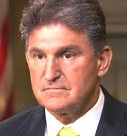 Manchins Attempt To Grow West Virginia's Economy Failed
Manchins Attempt To Grow West Virginia's Economy Failed According to the below article first written and published by Sean O’Leary on May 23, 2012, US Senator Joe Manchin’s decision to settle for the worst in schools, health care and infrastructure just to show he can balance a budget while governor, will ultimately bring his candidacy to an "ignominious end."
O’Leary writes that…Some people believe Senator Joe Manchin will run for president someday. If he does, Manchin will almost certainly tout his term as West Virginia governor during which he cut taxes and balanced budgets in one of the most economically depressed states. And, if Manchin’s candidacy gains traction, his opponents will respond.
They’ll say, "Joe, anyone can balance budgets if you’re willing to settle for the worst schools, the worst health care, and the worst infrastructure in the nation. West Virginia is the poorest, least educated, and unhealthiest state. Is that what we want for America?" The accusation won’t be entirely fair. West Virginia isn’t the worst state in every category. In some, we rank as high as 47th or 48th. But, for political purposes, the claim will be true enough. West Virginians will be humiliated and Manchin’s candidacy will come to an ignominious end.
This gaze into the future isn’t done to help Joe Manchin with his career choices. It’s to point out that, as governor, Manchin aggressively cut business taxes in order to grow West Virginia’s moribound economy and it didn’t work. The price we’re paying now isn’t just our lowest-in-the-nation level of adult employment. It's also chronic under-investment in the state and its people, which means our future prospects are as dim as our present plight. And worse, current governor Earl Ray Tomblin and the legislature continue to pursue the same failed policies. But, why did the strategy fail? And why do state leaders continue to believe in the tax cut fairy?
Basically there have been two kinds of cuts: reductions in the Corporate Net Income and Business Franchise taxes (CNIT/BFT), which apply to all businesses, and targeted tax incentives, such as those offered to Shell Oil in our failed pursuit of the ethane cracker plant. Examining both types requires more space than a single column permits. So, today we’ll address CNIT/BFT and in two weeks explore targeted tax incentives.
The theory behind cutting CNIT/BFT is that doing so puts money in the pockets of businesses enabling them to expand and hire while making West Virginia more competitive with other states in attracting new businesses.
As Ted Boettner and the West Virginia Center on Budget and Policy has thoroughly documented, CNIT/BFT, which made up almost 13 percent of general fund revenues in 1990, has been cut to the point that they comprise only about 4 percent in 2012, with the slack made up by personal income and severance taxes. CNIT/BFT is scheduled for additional cuts over the next three years and businesses are now lobbying for cuts to the state’s Business Personal Property Tax as well.
Yet we’ve seen little or no incremental growth, a point also documented by the Center on Budget and Policy. Meanwhile, the state’s ability to address education, infrastructure, and health care issues has been hobbled by a lack of funds.
The reason for this debacle is that, while in the right conditions business tax cuts can be effective, those conditions don’t exist in West Virginia and aren’t likely to anytime soon. Business tax cuts work when businesses want to expand, but can’t because loans and other funding instruments are prohibitively expensive. Today, however, we have the opposite situation. Interest rates have never been lower making funding inexpensive even without tax cuts.
Moreover, cheap money or not, businesses don’t expand unless they have unmet demand for their products. But, we’re still feeling the effects of a recession whose signature characteristic was a drying up of demand, which from all indications will continue to be weak. Third, as a percent of business’s operating costs, the CNIT/BFT cuts are so small and spread so thin, they’re not sufficient to change behavior. So, they merely reward businesses for doing what they would have done anyway.
Fourth, West Virginia’s business tax environment is already quite competitive ranking 23rd among all states in the Tax Foundation’s latest State Business Tax Climate Index. Also, West Virginia wages are 20 percent below the national average, which is a bigger incentive than if we eliminated business taxes altogether. Finally, much of the money that companies retain from tax cuts leaves the state. West Virginia is unusually dependent on out-of-state employers. When Wal-Mart, our largest employer, gets a tax cut, the savings go to corporate headquarters in Arkansas.
In short, money is squandered with little gain. So, why in the absence of beneficial results, do our leaders continue to believe in the tax cut fairy? Probably because cutting taxes can be dressed up as good public policy and it pleases important constituents. However, in reality, we only cripple the state’s ability to address the fundamental issues that discourage businesses from locating and expanding in West Virginia – the lack of an educated workforce, inadequate infrastructure, and a poor quality of life.
By handing out ineffectual tax cuts rather than addressing these issues more aggressively, the governor and legislature are basically conceding that they lack ideas, motivation, and the expectation that the challenges can be overcome. Still, some will object that West Virginia is, in fact, trying to address these problems and that in some areas the state’s effort is equal to or greater than national averages.
But, to use a medical analogy, if other states have economic colds or even the flu, West Virginia has cancer and cancer requires more than an average level of treatment.
End of Story
Jack Swint-Publisher
West Virginia News
E-Mail: WestVirginiaNews@gmail.com
Website: http://WVNewsOnline.com
Blog: http://WestVirginiaNews.blogspot.com
Twitter: @WVNewsOnline
LinkedIn: Jack Swint
Links
The State Of My State
.
.
.
.
.
.

No comments:
Post a Comment